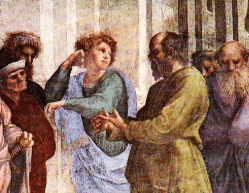Apology (Plato)

I will begin at the beginning, and ask what the accusation is which has given rise to this slander of me, and which has encouraged Meletus to proceed against me. What do the slanderers say? (...) "Socrates is an evil-doer, and a curious person, who searches into things under the earth and in heaven, and he makes the worse appear the better cause; and he teaches the aforesaid doctrines to others."
One of Plato's dialogues, the Apology (like all works by Plato) takes place in Greece in the 5th century BC, being written a little bit later. It describes the famous trial of Socrates, performed in Athens after he was accused of blasphemy and corruption of youth. The degree in which it reflects the real event is debatable, but the trial must have had many witnesses (with Plato most probably being one of them), who could help establish the accurate version of all three speeches. Nonetheless, the dialogue is impressive by itself because of its literary value. Of all Plato's dialogues, this one is used as a translating exercise by the students of classical Greek most often, because it is relatively easy to read and very well-written (with numerous examples of famous Socratic irony) at the same time.
Apart from being one of the oldest examples of the Law Procedural genre in history, it is an important ethical work, discussing the significance of truth in ethics and the real meaning of death. Although, as with all dialogues written by Plato, it is debatable in what degree it describes the historical Socrates instead of being an Author Tract, it is usually acknowledged to be one of the earliest Plato's texts, which mean there is a good chance that the Socrates from Apology expresses his own views (in the latter case it may be the case when Shaming the Mob did not work). Some interpreters say that the dialogue, along with a few other Plato's works, foreshadows Christian ethics and eschatology. As Socrates himself says: God only knows.
- Appeal to Pity: Averted. This is what the accusers expected Socrates to do, and if he did, it would most probably save him (even though he would lose his authority over the Athenians), but he preferred to risk his life than humiliate himself in public.
- Chewbacca Defense: Socrates does this many times, often using Appeal to Ridicule.
- Cool People Rebel Against Authority: The Cool Old Guy, Socrates.
- Democracy Is Bad: A possible message of the text.
- Disproportionate Retribution: Scholars still debate over the actual reason of Socrates' trial, though - it might have been more or less connected with politics rather than philosophy, in which case 'corrupting youths' would mean actively encouraging the rule of aristocracy rather than democratic government.
- Don't You Dare Pity Me!: Socrates. Even more so in Phaedo, but the tendency is obvious already in the Apology.
- Downer Beginning: Along with...
- ...DownerEnding
- Eccentric Mentor: Socrates to many of the people present. He lampshades it in his defensive speech.
- Good Feels Good: Socrates believes this.
Socrates: No evil can happen to a good man, either in life or after death.
- The Gadfly: Trope Namer: Socrates compares his relationship to the Athenian democracy to that of a gadfly pestering a horse.
- Hearing Voices: The way Socrates contacts with his mysterious inner spirit.
- I Won't Say I'm Guilty: Even though his friends persuaded him to do so (see Criton).
- Irony: This text is made of it.
- Mentor Occupational Hazard: Socrates.
- Miscarriage of Justice: One of the best known in history.
- Moral Guardians: Socrates' accusers.
- Motive Rant: Socrates had no choice but to constantly annoy the Athenians by proving them their stupidity, because he was told by a god to do so. However, it turns out that It Sucks to Be the Chosen One.
- Not Afraid to Die: One of Socrates' reasons is that We All Die Someday, and you never know when Life Will Kill You.
- Older Than Feudalism: By 800 to 1000 years.
- The Philosopher: Guess who?
- Principles Zealot: Lampshaded in Criton, which describes Socrates' conversation with a friend after the trial.
- Prophecy Twist: Subverted. Socrates offers a twisted interpretation of the prophecy as a justification of his deeds (the implication being that he is a victim of the prophecy - IF he misunderstood it - in a similar way to Oedipus), but both he and his accusers know perfectly well that the twist (if not the prophecy) is invented by him.
- Real Person Fic: Like every Plato's dialogue.
- Seeker Archetype: Socrates, the seeker of truth.
- Unaccustomed as I Am to Public Speaking: This is how Socrates poses himself in his beginning words, when he says that he is a first-time defendant and does not even know proper terminology used during the trials.
- Victorious Loser: And a Doomed Moral Victor, no less.